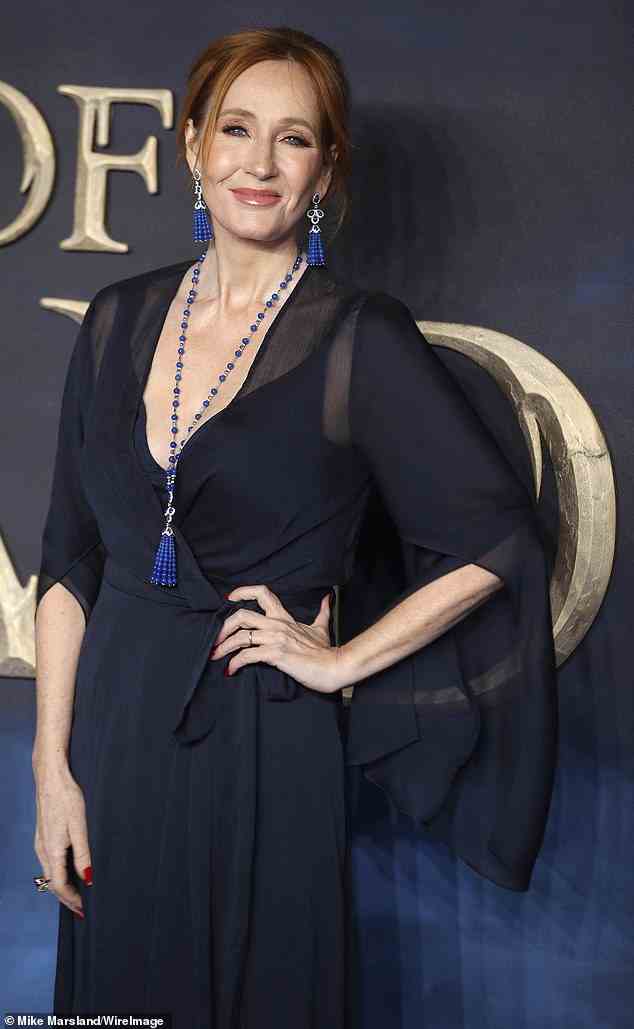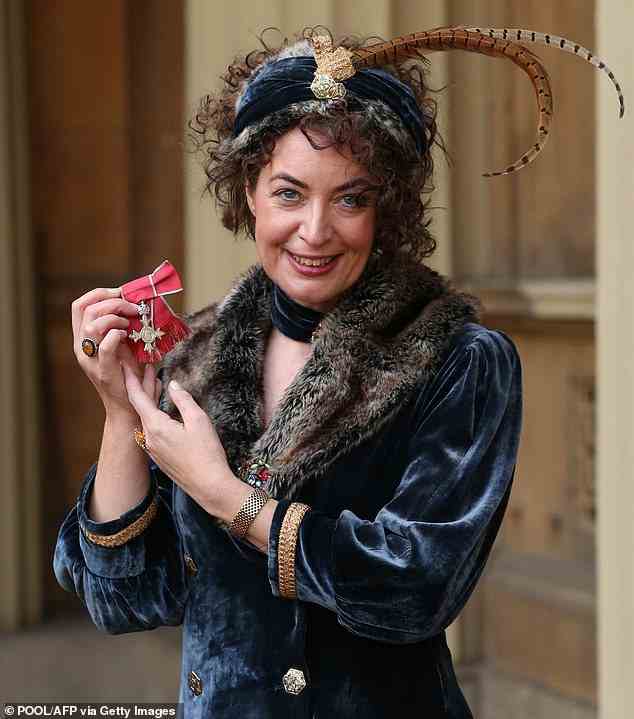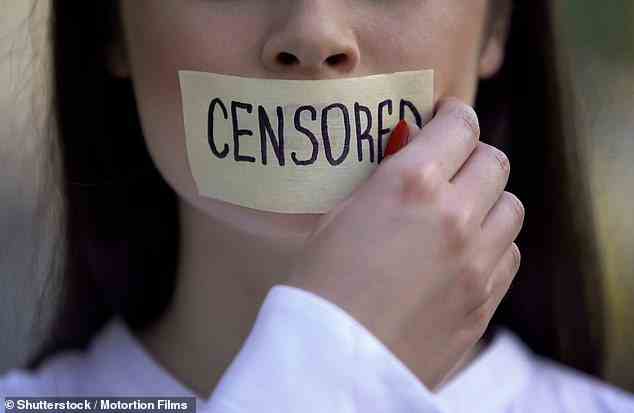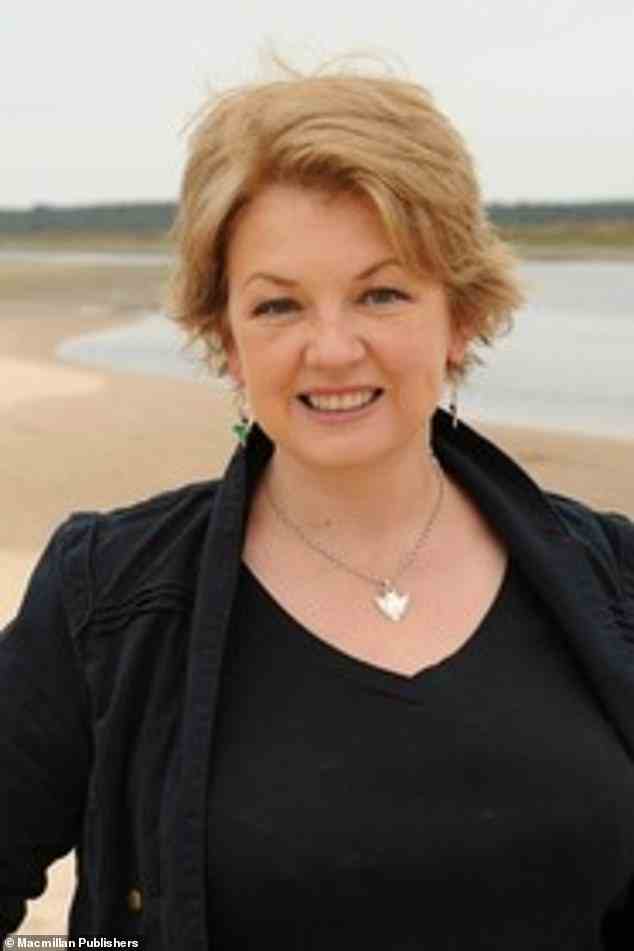Once upon a time, in a halcyon era that now seems like a distant golden age, writing books was a creative endeavour; a job in which you let your imagination take flight.
Various points of view were allowed to flourish. Stories were peopled by both heroes and villains. The offensive, the reprehensible, even the downright evil, coexisted with the noble and good.
Fiction was as multi-faceted as the world we live in, and writing was a realm of free expression in which authors had licence to provoke thought, illuminate discussion, even — dare I say it — voice unfashionable opinions without fear of being pilloried and ‘cancelled’.
White authors such as Alexander McCall Smith could invent black characters, as he did in his wildly successful, Botswana-based The No. 1 Ladies’ Detective Agency, without being accused of ‘cultural appropriation’.
Thomas Harris could conjure from his fertile mind the grotesque Dr Hannibal Lecter in The Silence Of The Lambs without being accused of celebrating cannibalism. And he could invent the chilling serial killer Buffalo Bill — who murdered and skinned overweight females to make a ‘woman suit’ out of their skin — without being cancelled for transphobia.
In that not-so-distant past JK Rowling could have freely expressed a belief that a biological male, with a man’s body and genitalia, could not become a woman simply because he felt like one.
Once upon a time, in a halcyon era that now seems like a distant golden age, writing books was a creative endeavour; a job in which you let your imagination take flight, writes Gillian Philip
Today all that has changed. Our freedom to think expansively and creatively, even to express our own views, is being undermined as surely as it would be in a totalitarian state. Books are literally being pulped if their authors refuse to toe the line. It is as if the Communist Red Guard has taken over.
And some of us, myself among them, who have challenged the prevailing orthodoxy on anything from transgender issues to race have been summarily dropped by our publishers.
Chilling isn’t it? The change has crept up on us insidiously. Today we live in a dystopian world where writers are cowed, terrified of causing offence.
Before we even put fingers to keyboard we are thinking about the all-powerful lobby of censors who might construe something we have written as objectionable.
I know this because I am a writer — or, more specifically, was one — who fell prey to publishing’s ‘woke’ agenda when, two years ago, I offered my support to JK Rowling on Twitter, for the stand she had taken against transgender people being allowed to identify as male or female at will.
I shared her concern that there should be checks on potential predators who might take advantage of the relaxed rules.
I added the hashtag #IStandWithJKRowling to my Twitter handle in response to the author’s essay, in which she revealed that she was a domestic abuse survivor and argued that letting any self-identifying trans woman into single-sex spaces without appropriate checks could present a danger to females.

I was subjected to a torrent of abuse on social media. Like Rowling, even though I am not remotely transphobic, I was called everything from a ‘transphobe’ to ‘a piece of s***’. I was labelled a ‘Terf’ (Trans-Exclusionary Radical Feminist, the derogatory term used by transgender activists for the women they believe don’t back their cause)
The hue and cry this provoked was unimaginable. I was subjected to a torrent of abuse on social media. Like Rowling, even though I am not remotely transphobic, I was called everything from a ‘transphobe’ to ‘a piece of s***’.
I was labelled a ‘Terf’ (Trans-Exclusionary Radical Feminist, the derogatory term used by transgender activists for the women they believe don’t back their cause).
My successful career as an author — one of a team writing animal fantasy novels for children between eight and 12 under the name Erin Hunter — was obliterated overnight.
The company I worked for, Working Partners — a book packager that sells concepts and series to different publishers — issued a pious email to all those who had complained to the firm about me.
‘The worlds created by Erin Hunter are meant to be inclusive for all readers and we want to let you know that Gillian Philip will no longer be writing any Erin Hunter novels,’ they wrote to the anonymous trolls who had sent me death threats.
My career was literally cancelled. Although the job was one I loved — I had won awards and made eight promotional tours of America, where the Erin Hunter series is huge — I have felt too traumatised to begin writing another novel since.
My husband Ian had died a month before I was dropped by my publishers, in May 2020, leaving me a widow with two teenage children. The firm sent flowers and a note of condolence. Weeks later they were ruthlessly ending my job. The combination of grief and stress almost floored me.

Kate Clanchy was criticised for using ‘racist tropes’ in her description of pupils as having ‘chocolate-coloured skin’ or ‘almond eyes’
Yet the ‘woke’ brigade who cancelled me often use the hashtag: ‘Be kind’. It seems to me that their humanity is selective. Only those they consider deserving of it are offered compassion, which tells us just how morally bankrupt they really are.
I now work as an HGV driver, a job I find more congenial — actually more intellectually liberating —because my workmates do not mind what opinions I have and are happy to discuss them with me.
They are also much less misogynistic than I have found the publishing industry to be.
It is ironic, too, that the cadre of self-appointed censors in the book world, who feel it is their role to defend every minority group from the tiniest slight, is largely white, privileged and middle class.
These self-appointed ethical guardians have appropriated and warped a term, ‘woke’, that was originally coined by black African Americans to describe people who are awake to racism and prejudice.
But, of course, the publishing zealots are blind to such anomalies: ‘cultural appropriation’ is not a transgression that applies to them.
They take their order from bloggers, social media users — no matter how venomous and unhinged — and the growing army of ‘sensitivity readers’ who are employed to scrutinise every pre-publication text for even the most minor infractions.

It is as if we can’t trust children to have their own moral compass any more: their thoughts have to be directed and channelled in an approved way (stock image)
So ludicrously inflated has the role of these scrutineers become that whole teams are employed to pore over proofs. The results can be farcical: what is praiseworthy to some readers offends others.
And it’s not only professional readers that can derail your career. The critically acclaimed author and former teacher Kate Clanchy was forced to part company with her publisher Pan Macmillan earlier this year after her Orwell Prize-winning memoir Some Kids I Taught And What They Taught Me, was subjected to a trashing from Goodreads, a forum in which readers review and give star ratings to books.
Clanchy was criticised for using ‘racist tropes’ in her description of pupils as having ‘chocolate-coloured skin’ or ‘almond eyes’.
One sensitive reader objected to Clanchy’s use of ‘disfigure’ to describe the effects of spoil heaps on a landscape; another quibbled that she should not use ‘handicap’ in its ordinary sense of impede.
Despite Clanchy’s former pupils springing to her defence, and endorsements on her book’s dust jacket praising its ‘inclusiveness’ and ‘humanity’, she and her publisher parted ‘by mutual consent’. Last month, she acquired a new publisher, Swift Press, which is to reissue her book, with amendments.
In a more benign era we authors used to joke about Goodreads. We’d urge each other not to look at it because it was damaging to the ego to read a one-star review.
There was even a Twitter account (@dontgoodreads) dedicated to the thought. But that is as far as our concerns reached. How extraordinary then that today Goodreads reviewers have such a stranglehold over publishers that they have the power to destroy established writers who do not conform to ‘woke’ views.

In the transwoman Grace Lavery’s newly published memoir Please Miss, there is a reference to the author’s penis as ‘a miscarried foetus’
Many modern authors would mock the Victorians’ attitude to children’s literature, which decreed that stories should be morality tales encouraging good citizenship and reinforcing the accepted ethics of the day.
Yet the ‘woke’ lobbyists are doing just that — encouraging didactic preachiness at the expense of free imagination and empathy.
It is as if we can’t trust children to have their own moral compass any more: their thoughts have to be directed and channelled in an approved way.
Publishing has become censorious, nannying, overbearing. Authors’ consciences — or even those of their editors — are no longer trusted.
And the young adult side of the industry has capitulated to the tyranny completely.
The stifling outsourcing to sensitivity readers; the indignation of the fresh-faced, privileged and entitled juniors of the publishing world who insist that every email is signed off with their favoured personal pronouns: all of it is deeply concerning.
I try to make light of it by adopting ‘hi/vis’ as my personal pronouns on my Twitter page. It’s my joke, because I now wear a luminous yellow jacket for work. I hope I infuriate the publishing interns, the bloggers and the Twitterati who take these matters so seriously.

The stifling outsourcing to sensitivity readers; the indignation of the fresh-faced, privileged and entitled juniors of the publishing world who insist that every email is signed off with their favoured personal pronouns: all of it is deeply concerning (stock image)
But we have reason to be afraid for the publishing industry, because it’s destroying itself. Many senior people know there’s a problem, but they are too scared to address it.
I expect that the only way I will write again is if I self-publish — a route once derided as the last resort of amateurs, but is now quite possibly the only outlet for honest, direct and emotional writing.
I could list dozens of examples of privileged, white, middle-class writers who bully other writers into changing their work to suit their own prejudices.
Such a clique has driven my friend, the children’s author Rachel Rooney, out of publishing.
Rachel is an autistic author who is devoted to child development and safeguarding, and her writing was critically celebrated.
Yet a bullying campaign by other children’s writers forced her to stop writing.
Rachel’s delightful picture book My Body Is Me was labelled ‘transphobic’, simply because it celebrated the fact that no child’s body is ‘wrong’.

I expect that the only way I will write again is if I self-publish — a route once derided as the last resort of amateurs, but is now quite possibly the only outlet for honest, direct and emotional writing. Pictured: Ms Philip
Her transgression was to write a book to counteract what she described as an ‘explosion of titles promoting the idea that children who felt confused about their gender may be ‘trapped in the wrong body’. And the persecution goes on even now. Only this week, prominent children’s writers whipped up an abusive mob against her, forcing her off Twitter.
A few weeks ago, Onjali Rauf, a Muslim woman writer who campaigns against modern slavery and human trafficking and was shortlisted for the Phoenix Book Award, was snubbed by the agent of another nominated author for being a Terf.
This agent simply cut Onjali’s name out of the image she posted on Twitter of shortlisted authors. She did so because she knew she could — without censure from the publishing industry.
Onjali’s ‘transgression’ is a familiar one: she had criticised trans activists for ‘drowning out the voices of the very women who laid the foundations of the freedoms they enjoy’.
It is curious to me that in today’s topsy-turvy world some people’s sensitivities simply don’t matter.
In the transwoman Grace Lavery’s newly published memoir Please Miss, there is a reference to the author’s penis as ‘a miscarried foetus’.
I find this offensive — as I am sure it would also be to many women who have miscarried babies. I do not believe it should be censored, but I reserve the right to find it disgusting.
However, it does not seem to have occurred to Lavery’s publishers to run the passage past the ‘sensitivity readers’ — because, dear reader, the sad truth is the sensibilities of you and me no longer count.

